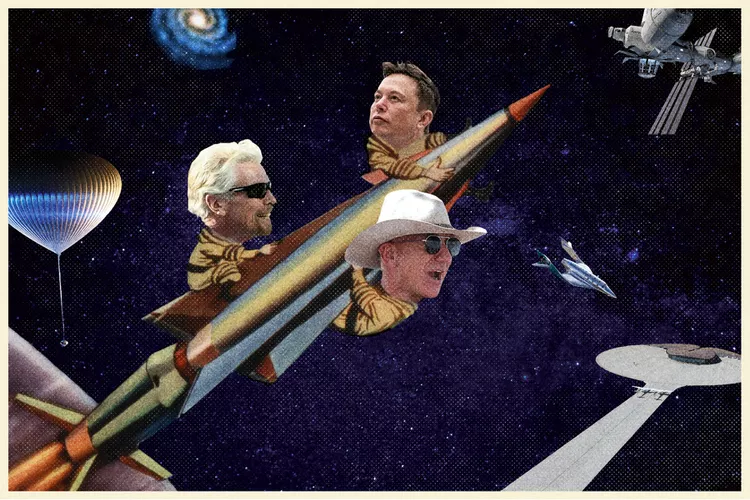The Dawn of Space Tourism: A New Frontier
In July 2021, Richard Branson and Jeff Bezos took to the skies, marking a significant advancement for the space tourism industry. Although their launches occurred during a global pandemic and climate emergency, the implications for the future of humanity are vital and should not be underestimated.
With the initial crewed launches of Virgin Galactic’s supersonic space plane and Blue Origin’s reusable rocket, commercial space travel is officially underway. Both companies envision regular scheduled trips for paying space tourists in the near future, with their inspiration rooted in the early years of human spaceflight.
The Space Race: Then and Now
Blue Origin chose an auspicious date for its first crewed spaceflight. July 20, 2021, coincided precisely with the 52nd anniversary of Apollo 11, when astronauts Neil Armstrong and Buzz Aldrin became the first humans to walk on the moon. 2021 also marked significant milestones in space travel history.
April 12 celebrated the 60th anniversary of Russian cosmonaut Yuri Gagarin, the first human to reach space and orbit Earth. Furthermore, May 5 marked the 60th anniversary of NASA’s Freedom 7 mission, featuring Alan Shepard’s suborbital flight lasting just 15 minutes, during which he became the first American in space.
The New Shepard launch system from Blue Origin mirrors America’s inaugural 1961 space flight, offering comfortable seating and large windows for passengers. From Launch Site One in West Texas, the rocket ejects a capsule carrying up to six individuals (with no pilot) into space, descending 15 minutes later via parachutes.
Conversely, Virgin Galactic’s experience involves its spaceplane, SpaceShipTwo VSS Unity, which accommodates six passengers along with two skilled pilots. The craft takes off from Spaceport America in New Mexico, launching from a mothership before detaching at 52,000 feet to reach Mach 3 speeds and touch the edges of space. After several moments of weightlessness, the spaceplane glides back to the ground.
The Price for a Ticket to Space
Short trips to space boast price tags ranging from $250,000 to $500,000. However, in April 2022, a private trip offered even higher pricing, initiated by Elon Musk. SpaceX’s Axiom Mission 1 successfully transported four private astronauts on an orbital mission aboard Crew Dragon.
Costing approximately $55 million per ticket, this journey to the International Space Station epitomizes luxury space tourism. Christina Korp, cofounder of Space for a Better World, notes, “They did what real astronauts do, and it’s telling that Virgin Galactic and Blue Origin conducted their flights prior to Axiom’s mission.” Axiom Space also plans to establish the first “space hotel” by 2025, enhancing the experience for potential space tourists.
The Future of Space Tourism—and Our Planet
Musk envisions Mars colonies and humanity expanding into the cosmos, while SpaceX has profited significantly from NASA contracts. This includes launching supplies to the ISS and ferrying astronauts since summer 2020. The Starship craft is being tested for an ambitious mission to put the first woman and subsequent man on the moon by 2025.
However, space tourism serves a greater purpose: to contribute toward saving the planet. Blue Origin is preparing to test its reusable New Glenn rocket, designed for both cargo and astronauts. Bezos advocates that shifting heavy industry to space may help mitigate pollution on Earth, a notion that hinges on safe and affordable space travel, ultimately fostering a competitive space economy akin to that of mass tourism.
Branson’s goal aligns closely with increasing accessibility to space. After the first flight, he remarked, “Our mission is to make space more accessible to all,” highlighting the presence of microgravity experiments on board.
While the direct benefits of space tourism for Earth remain uncertain, the space sector has a strong history of innovation. Korp emphasizes that solar power origins come from the space program, with solar panels evolving from technology used in satellites. Moreover, the space industry continuously monitors climate changes and supports the development of sustainable practices through various experimental missions.
This perspective reinforces that space exploration transcends mere escapism. Bezos articulated the point succinctly: “This is the only good planet in the solar system, and we have to take care of it.” Achieving affordable space travel is key to long-term projects aimed at countering climate change.
Additional options for space access are emerging. The Russian space agency Roscosmos plans to take “citizen space explorers” to the ISS, while Space Perspective offers a more budget-friendly approach with flights via a high-performance space balloon.
The six-hour flight, priced at $125,000 per person, is set to launch from Space Coast Spaceport in Florida in 2024, with the first flight already sold out. Jane Poynter, founder of Space Perspective, positions these flights as an opportunity for contemplation, offering a gentle ascent to witness Earth’s splendid view from space.
Space tourism has officially launched, and the public can anticipate a surge in “Earth selfies” on social media platforms.
Program Credits
Editorial Lead: Elizabeth Rhodes
Contributors: Jamie Carter and Stefanie Waldek
Visuals Editor: Mariah Tyler
Art Director: Jenna Brillhart
Designer: Sarah Maiden





